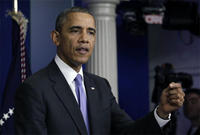-
High level of “brain waste” among highly educated immigrants
Many highly educated immigrants coming to the United States without a job lined up have been unable to find work at their level of education, leading to considerable “brain waste,” researchers have found. The prevalence of such “brain waste” exceeded 40 percent for immigrants with a bachelor’s degree, 50 percent for those with a doctoral or professional degree, and 75 percent for those with a master’s degree.
-
-
CBP awards $145 million border towers contract to Elbit
DHS’s Customs and Border Protection(CBP) has awarded Elbit Systems of America, a subsidiary of Israeli based Elbit Systems, a $145 million contract for the Integrated Fixed Tower (IFT) project along the Mexico-Arizona border. The first phase of the project includes a number of observation towers along the Nogales, Arizona border with Mexico. Additional options could include towers at over five other border sections in Arizona.
-
-
Two politicians insisting on more congressional oversight of DHS
The lawmakers who support the proposed DHS Acquisition Accountability and Efficiency Act, authored by Representative Jeff Duncan (R-South Carolina), are doing exactly what they were sent to Washington to do: they are attempting to provide fiscal oversight over one of our largest federal agencies. Hopefully, politicians on both sides of the aisle will join Representatives Duncan and Michael McCaul (R-Texas) in passing legislation forcing DHS to use tax payer money in the most efficient ways possible, including demanding contractors meet the terms of their contracts, not rewarding contractors who have a record of poor performance, and completing their security-related projects in a timely manner.
-
-
Robots help Border Patrol navigate smugglers’ tunnels
The U.S. Border Patrol is using remote- controlled robots to navigate tunnels used by drug cartels and smugglers to import drugs, weapons, and people from Mexico into the United States.The robots are used as the first eyes on places deemed too dangerous for humans to explore.
-
-
Washington State offers college financial aid to children of undocumented immigrants
Governor Jay Inslee of Washington State yesterday signed legislation which will offer college financial aid to students brought into the United States illegally by their parents. California, Illinois, Texas, and New Mexico have passed similar legislations. The measure represents a shift in the position of State Senate Republicans: last year, the GOP-controlled Senate blocked a similar measure,called the Dream Act of Washington State, but earlier this month the Senate passed its own version of the bill, which the the governor, a Democrat, signed.
-
-
Secure Communities triggers deportation of undocumented immigrants with no criminal records
The U.S. Immigration and Customs Enforcement’s (ICE) Secure Communitiesprogram sends fingerprint data from local law enforcement and the Federal Bureau of Investigationto immigration officers to identify and deport illegal immigrants who commit major crimes. The program has expanded from fourteen jurisdictions in 2008 to more than 3,000 today. Immigration advocates say that the program’s emphasis on identifying and deporting undocumented immigrants who have committed crimes in the United States notwithstanding, it has also triggered the deportation of 5,964 undocumented immigrants with no criminal records.
-
-
U.S. to use more discretion applying terrorism-related inadmissibility immigration rules
The Obama administration has relaxed the rules for would-be asylum-seekers, refugees, and individuals who want to come to the United States or remain in the country despite their classification as having provided “limited material support” to terrorists or terrorist organizations.DHS says that rigorous s security and background checks will still be applied to asylum seekers, including those already in the United States, but officials will take into consideration“routine commercial transactions or routine social transactions,” Arab Spring-related anti-regime activities, and more. Current rules already allow exemptions for providing medical care to terrorists or acting under duress.As of 2011, 4,400 immigration cases are on hold as a result of the old terrorism-related inadmissibility rules.
-
-
French anti-Semitic entertainer banned from U.K.

The United Kingdom has banned the anti-Semitic French comedian Dieudonné M’bala M’bala from entering the country. Dieudonné was planning to go to Britain to offer support to Nicolas Anelka, the French 34-year old forward who plays for the West Brom Albion soccer club. On 28 December, Anelka celebrated a goal he scored against West Ham by performing the “quenelle” – an inverted Nazi salute popularized by Dieudonné. Owing to its creator and what he says about Jews and his mocking of the Holocaust, the quenelle carries an unmistakably anti-Semitic message, although some of those who performed it in public argue they were under the impression it was merely and anti-establishment and anti-system gesture.
-
-
Obama uses executive power to changes immigration policy

President Barack Obama is using executive power to tackle the country’s immigration issues while Congress makes little progress on immigration overhaul. The president issued executive orders prohibiting deportations of individuals who arrived in the United States illegally as children, individuals who care for children, and individuals who have no criminal records. Recently, some relatives of military service members living in the country illegally have been allowed to remain in the country as a way to lessen stress on the military and reward veterans.
-
-
Modernizing DHS border enforcement systems may cost more than $1.5 billion
TECS is the primary DHS system that Customs and Border Protection (CBP) personnel use to screen foreigners against a variety of watchlists, and it manages case files for Immigration and Customs Enforcement (ICE). ICE assignments tracked include money-laundering probes, online pornography investigations, and phone data analyses. A GAO audit last month found that the planned $1.5 billion upgrade to TECS now has no foreseeable end-date or final cost estimate.
-
-
Africa’s Sahel region threatened by terrorism, organized crime: Ban Ki-moon
Terrorism, trafficking in arms, drugs, and people, and other transnational forms of organized crime are threatening security in Africa’s vast sub-Saharan Sahel region, Secretary-General Ban Ki-moon warned the Security Council yesterday. He called for continued strengthening of The UN Multidimensional Integrated Stabilization Mission in Mali (MINUSMA), a 12,600-strong force set up by the Council in April and authorized “to use all necessary means” to carry out security-related stabilization tasks, protect civilians, UN staff, and cultural artefacts in the cou8ntry, and create the conditions for provision of humanitarian aid.
-
-
Government agencies recognized for engagement with industry
The Washington Homeland Security Roundtable (WHSR) established the Industry Engagement Awards to recognize exceptional efforts by government agencies to collaborate, engage, and partner with industry. Last year, WHSR recognized both the Transportation Security Administration (TSA) and the U.S. Border Patrol for their engagement and programs with industry through WHSR. At their upcoming 4 December holiday reception, WHSR will again recognize various government leaders of DHS component agencies for their contributions to partnering and engaging with industry.
-
-
Sahel-Sahara countries to build joint security training center in Rabat
At a meeting on common security challenges in north and west Africa, government officials from nineteen Sahel, Sahara, and Maghreb countries agreed to build a joint security training center in Rabat, Morocco, to increase the competency of the region’s security forces to deal with growing terrorist and jihadist threats. The nineteen countries will also increase information sharing and harmonize the legal means they use to fight security threats. The ministers said that one of the first steps toward improving security in west and north Africa would be to improve monitoring of border and increase border security.
-
-
U.S. defense industry pushes for immigration reform
CEO Linda Hudson of BAE Systemsis making a plea for immigration reform as she links the defense industry’s urgent need for skilled engineers to the push for the United States to develop a simpler path to citizenship for skilled and educated immigrants. She also says that “if we’re forced to forgo international talent we damn well ought to be doing something to produce that talent domestically.”
-
-
TCOM’s aerostat systems help U.S. Border Patrol

Several TCOM aerostat systems are being evaluated by Border Patrol agents in operational environments along U.S.-Mexico border. TCOM’s aerostat systems enable operators to view activity along the border. The system can typically remain aloft for two weeks to one month at a time. With operational altitudes of up to 5,000ft, the aerostats provide monitoring of thousands of square miles.
-
- All
- Regional
- Water
- Biometrics
- Borders/Immig
- Business
- Cybersecurity
- Detection
- Disasters
- Government
- Infrastructure
- International
- Public health
- Public Safety
- Communication interoperabillity
- Emergency services
- Emergency medical services
- Fire
- First response
- IEDs
- Law Enforcement
- Law Enforcement Technology
- Military technology
- Nonlethal weapons
- Nuclear weapons
- Personal protection equipment
- Police
- Notification /alert systems
- Situational awareness
- Weapons systems
- Sci-Tech
- Sector Reports
- Surveillance
- Transportation
Advertising & Marketing: advertise@newswirepubs.com
Editorial: editor@newswirepubs.com
General: info@newswirepubs.com
2010-2011 © News Wire Publications, LLC News Wire Publications, LLC
220 Old Country Road | Suite 200 | Mineola | New York | 11501
Permissions and Policies
Editorial: editor@newswirepubs.com
General: info@newswirepubs.com
2010-2011 © News Wire Publications, LLC News Wire Publications, LLC
220 Old Country Road | Suite 200 | Mineola | New York | 11501
Permissions and Policies
